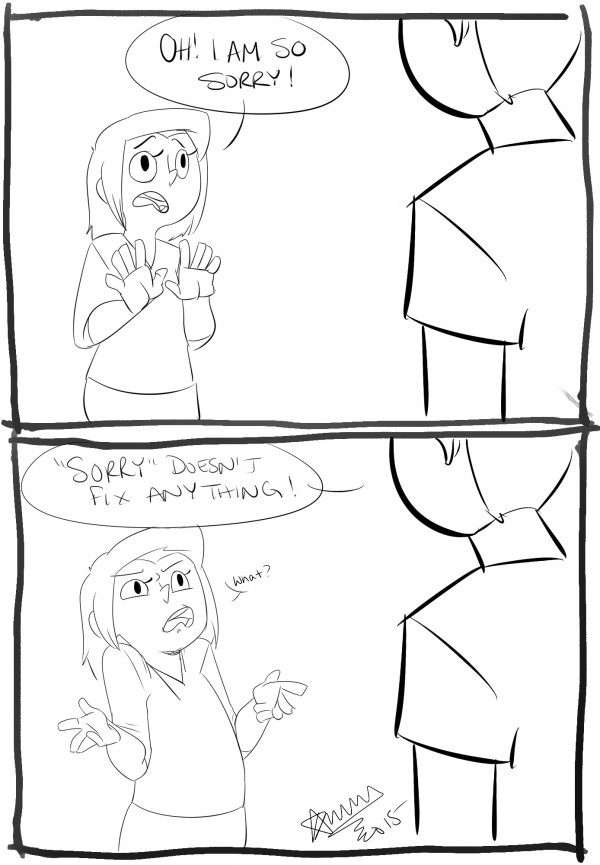HAYLEY ROSS | OPINION COLUMNIST
“Say you’re sorry.”
That is one of the first things our parents teach us when we are little.
And our pre-school teachers, dance instructors, soccer coaches, babysitters and basically every other adult in our young lives remind us regularly.
Sorry is the word that will make everything better.
We were told it was the word that would take back that tantrum, take back that slap to a little brother and take back calling that girl stupid.
Now, as young adults, we still use it for the little things, such as to take back that drunken fight or rude comment. It has become so ingrained in our vocabulary that we say it for just about everything.
Although the literal meaning of the word “sorry” may not have changed, how much weight the word holds has.
I say I am sorry when I bump into someone in the hallway, and I say it if I spill my water on the floor and it happens to reach someone’s feet; but I would also say it if I made someone cry or said something that I would never want someone to say to me.
It is the only word available to possibly cue someone in to when the genuineness and sincerity is at an all time high. There is nothing to make it obvious when someone is saying it because he or she feels it is necessary, appropriate or that he or she will be in the wrong if no apology is said.
It is hard to know when someone is saying it because he or she wants to and means it, because the word has been desensitized.
It is not a bad or a mean word, so the fact that its value and meaning has decreased has gone unnoticed by most. However, in daily conversation it becomes quite apparent that it is used way too much.
I know one can argue that this is a good thing – that it is good that people are constantly saying they are sorry – because it shows that people care.
But if you really think about it, doesn’t it actually show that people don’t?
When people say they are sorry for something, they are supposed to be saying it because they feel some sort of sadness for what they did. Whether it was interrupting someone’s conversation or kissing the boy their friend likes, people say they are sorry because they wish they had not done it.
Except the word sorry does not actually guarantee that anymore.
It has become a thing that if one says sorry after, it makes what has been done before OK. Its sincerity comes into question because people think they can get away with doing anything if they say the magic word right after. If someone does something over and over again, but they say they are sorry after each instance, it is apparently all right.
What our adults tried to teach us was that if we did something we should not have done, we should apologize for it; but, instead, what we have grasped is that if we say we are sorry, what we did is then inherently OK.
That is why we say it so often. We say it because if there is a slight chance we have offended someone, we want to be prepared. We aren’t looking out for other people’s feelings, we are trying to save our own asses.
When we were taught to say sorry, we were not given a booklet of rules. There is no chart with specific situations that we can match up to our own and see if it is an appropriate time to say it or to just let it be.
You are probably not sorry if you disagree with someone’s opinion in class, but I can bet you say sorry before you state you do not agree.
You are probably not sorry if you cooked dinner for someone and they did not like it, but you most likely said you were sorry even though you were cooking all day.
You are probably not sorry if you asked the Starbucks barista to redo your drink because they gave you the wrong one, but you definitely apologized for the extra five seconds of work they will have to do to actually get it right.
So I challenge you to not say it.
I am not saying that we should not apologize anymore. I just think we need to sift through the hundreds of times we do say it, and pick out the times when we completely and truly mean it.
If we do this, then there will not be a question of sincerity and that question of genuineness. No one will question if we are apologizing because we feel we have to. We need to give its value back.
When we do say it, it will mean so much more.

